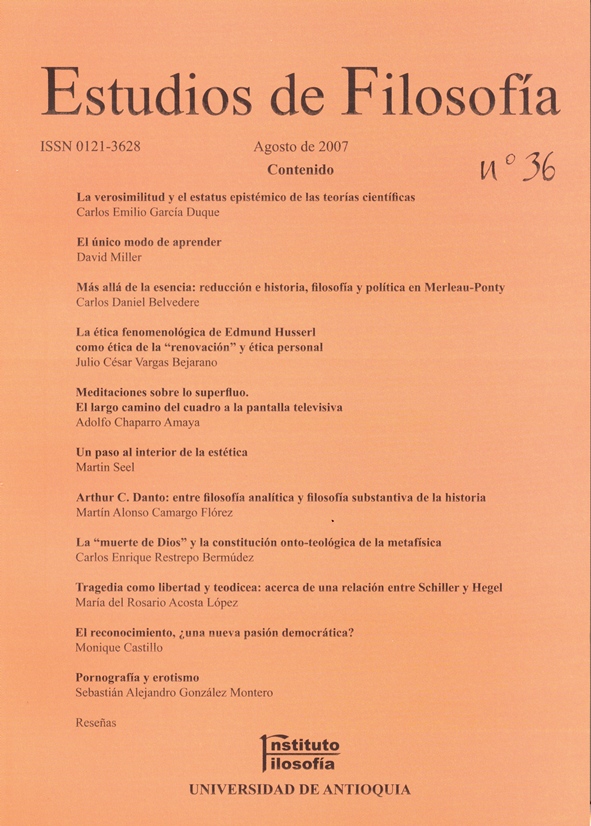La ética fenomenológica de Edmund Husserl como ética de la “renovación” y ética personal
DOI:
https://doi.org/10.17533/udea.ef.12738Palabras clave:
Ética fenomenológica, voluntad, tendencia pulsional, valor, persona, renovación.Resumen
La publicación relativamente reciente de los artículos de la revista japonesa Kaizo, titulados “Renovación del hombre y de la cultura” (1923-1924) y de las lecciones de ética impartidas por Husserl en los años de 1920 y 1924 permite acceder al nuevo rumbo que siguieron sus reflexiones éticas. Asimismo, estos textos permiten comprender la posición crítica de Husserl respecto de su primera versión de su ética, la cual se caracterizaba por ser una doctrina universal de los valores basada en una axiología formal. A partir de los años veinte Husserl presenta una concepción novedosa de su ética, cuya principal base es la resolución del sujeto radical y volitiva por una vida consagrada a la responsabilidad y al amor. Este trabajo presenta cómo fue posible dicho tránsito y los rasgos generales de esta versión de la ética que se puede denominar también “personalista”.
Descargas
Citas
HUSSERL, E. Husserliana [Hua]. Gesammelte Werke. Martinus Nijhoff, Den Haag/Dordrecht, 1950, 38 Bänden.
___________. Ideen zu einer reinen Phänomenologie und phänomenologischen Philosophie. Erstes Buch [Hua 3]. Neu hrsg. v. K. Schuhmann, 1976 [Ideen I].
___________. Ideen zu einer reinen Phänomenologie und phänomenologischen Philosophie. Zweites Buch. Phänomenologische Untersuchungen zur Konstitution [Hua 3]. Hrsg. v. W. Biemel, 1976 [Ideen II].
___________. Die Krisis der europäischen Wissenschaften und die transzendentale Phänomenologie. Eine Einleitung in die phänomenologische Philosophie [Hua 6]. Hrsg. v. W. Biemel, 1954.
___________. Erste Philosophie (1923/24). Zweiter Teil. Theorie der phänomenologischen Reduktion [Hua 8]. Hrsg. v. R. Boehm, 1959.
___________. Phänomenologische Psychologie. Vorlesungen Sommersemester 1925 [Hua 9]. Hrsg. v. W. Biemel, 1962.
___________. Analysen zur passiven Synthesis. Aus Vorlesungs- und Forschungsmanuskripten 1918-1926 [Hua 11]. Hrsg. v. M. Fleischer, 1966.
___________. Zur Phänomenologie der Intersubjektivität. Texte aus dem Nachlaß. Erster Teil, 1905-1920 [Hua 13]. Hrsg. v. I. Kern, 1973.
___________. Zur Phänomenologie der Intersubjektivität. Texte aus dem Nachlaß. Zweiter Teil, 1921-1928 [Hua 14]. Hrsg. v. I. Kern, 1973.
___________. Zur Phänomenologie der Intersubjektivität. Texte aus dem Nachlaß. Dritter Teil, 1928-1935 [Hua 15]. Hrsg. v. I. Kern, 1973.
___________. Aufsätze und Vorträge (1911-1921) [Hua 25]. Hrsg. v. Th. Nenon und H.R. Sepp, 1987.
___________. Aufsätze und Vorträge (1922-1937) [Hua 27]. Hrsg. v. Th. Nenon und H.R. Sepp, 1989.
___________. Vorlesungen über Ethik und Wertlehre 1908-1914 [Hua 28]. Hrsg. v. U. Melle, 1988.
___________. Aktive Synthesen: Ausder Vorlesung "transzendentalen Logik“ 1920/21 [Hua 31]. Hrsg. v. Roland Breuer, 2000.
___________. Zur Phänomenologische Reduktion. Texte aus dem Nachlaß (1926-35) [Hua 34]. Hrsg. v. Sebastian Luft, 2002.
___________.Einleitungindie Philosophie. Vorlesungen 1922/23[Hua35]. Hrsg. v. B. Goossens, 2002.
___________.Einleitungindie Ethik. Vorlesungen Sommersemester1920/24 [Hua 37]. Hrsg. v. Henning Peucker, 2004.
Textos de Husserl que aún no están editados en las obras completas:
Husserl, E. Wert des Lebens. Wert der Welt. Sittlichkeit (Tugend) und Glückseligkeit . Hrsg. Ulrich Melle. Husserl Studies, Dordrecht, vol. 13 (3), 1997, pp. 201-235. DOI: https://doi.org/10.1007/BF00366577
Bibliografía secundaria
AGUIRRE, A. Zum Verhältnis von modaler und praktischer Möglichkeit. Phänomenologische Forschungen, Freiburg/München, vols. 24-25, 1991, pp. 150-182.
BRENTANO, F. Vom Ursprungsittlicher Erkenntnis. Felix Meiner, Hamburg, 1969. DOI: https://doi.org/10.28937/978-3-7873-2619-8
FINK, E. ¿Qué se propone la fenomenología de Edmund Husserl? Trad. de Raúl Iturrino Montes. Diálogos. Revista del Departamento de Filosofía, Universidad de Puerto Rico, Río Piedras, vol. 25 (56), julio de 1990.
HOYOS, G. Intentionalität als Verantwortung. Geschichtsteleologie und Teleologie der Intentionalität bei Husserl. M. Nijhoff, Den Haag, 1976.
__________. La ética fenomenológica como responsabilidad para la renovación cultural. En: Husserl, E. Renovación del hombre y de la cultura. Cinco ensayos. Anthropos, Madrid, 2002.
MELLE, U. Husserls personalistische Ethik. Conferencia en las Jornadas Husserl del Archivo Husserl de Colonia, realizadas el 26 de octubre de 2003.
SALINAS, P. Razón de amor. Cátedra, Madrid, 1996.
Descargas
Publicado
Cómo citar
Número
Sección
Categorías
Licencia
Derechos de autor 2007 Estudios de Filosofía

Esta obra está bajo una licencia internacional Creative Commons Atribución-NoComercial-CompartirIgual 4.0.
Los autores que publican en Estudios de Filosofía acuerdan los siguientes términos:
1. El Autor retiene el copyright del "Artículo", por el cual se entiende todos los objetos digitales que pueden resultar de la subsiguiente publicación o distribución electrónica.
2. En conformidad con los términos de este acuerdo, el autor garantizará a Estudios de Filosofía como Editor el derecho de la primera publicación del artículo.
3. El Autor le concederá al Editor un derecho perpetuo y no-exclusivo, así como una licencia de la misma clase, de publicar, archivar y hacer accesible el Artículo parcial o totalmente en todos los medios conocidos o por conocerse, derecho y licencia que se conocen como Creative Commons License Deed. Atribución-No Comercial- Compartir igual CC BY-NC-SA o su equivalente que para efectos de eliminar toda duda, le permite a otros copiar, distribuir, y transmitir el Artículo bajo las siguientes condiciones: (a) Atribución: Se deben reconocer los créditos de la obra de la manera especificada por el Autor a Estudios de Filosofía, pero no de una manera que sugiera que tiene su apoyo o que apoyan el uso que hace de su obra. (b) No Comercial: No se puede utilizar el Artículo para fines comerciales.
4. El Autor puede realizar otros acuerdos contractuales no comerciales para la distribución no exclusiva de la versión publicada del Artículo (v. gr. ponerlo en un repositorio institucional o publicarlo en un libro) con la condición de que haga el debido reconocimiento de su publicación original en Estudios de Filosofía.
5. A los Autores se les permite y Estudios de Filosofía promueve publicar en línea (online) la versión pre-impresa del Artículo en repositorios institucionales o en sus páginas web, antes y durante la publicación, por cuanto que puede producir intercambios académicos productivos, así como una mayor citación del Artículo publicado (ver The Effect of Open Access). Dicha publicación durante el proceso de producción y en la publicación del Artículo se espera que se actualice al momento de salir la versión final, incluyendo una referencia a la URL de Estudios de Filosofía.















